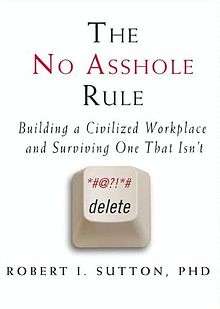The No Asshole Rule
 | |
| Author | Robert I. Sutton |
|---|---|
| Genre | Business |
| Publisher | Business Plus |
Publication date | February 22, 2007 |
| Pages | 224 |
| ISBN | 978-0-446-52656-2 |
| OCLC | 154698708 |
| 650.1/3 22 | |
| LC Class | HD58.7 .S935 2007 |
The No Asshole Rule: Building a Civilized Workplace and Surviving One That Isn't is a book by Stanford professor Robert I. Sutton, based on a popular essay he wrote for the Harvard Business Review. It sold over 115,000 copies and won the Quill Award for best business book in 2007.[1][2][3]
The theme of this book is that bullying behaviour in the workplace worsens morale and productivity. A rule is suggested to screen out the toxic staff—the no asshole rule. The author insists upon use of the word asshole since other words such as bully or jerk "do not convey the same degree of awfulness".[4] In terms of using the word in the book's title, he said "There's an emotional reaction to a dirty title. You have a choice between being offensive and being ignored."[5]
Two tests are specified for recognition of the asshole:[6]
- After encountering the person, do people feel oppressed, humiliated or otherwise worse about themselves?
- Does the person target people who are less powerful than him/her?
Their unpleasant behaviours were catalogued by Sutton as The Dirty Dozen:[7]
- Insults
- Violation of personal space
- Unsolicited touching
- Threats
- Sarcasm
- Flames
- Humiliation
- Shaming
- Interruption
- Backbiting
- Glaring
- Snubbing
Famous bosses who are cited as having weakened their position by such bad behaviour include Al Dunlap and Michael Eisner. Companies who are listed as having appropriate recruitment policies include: Barclays Capital, Google, JetBlue and Men's Wearhouse.[5][8] A special chapter is dedicated to "the virtues of assholes", in which Steve Jobs is discussed as a prime example.[9][10]
The book argues that asshole behavior is rather common by citing various studies:
[A] survey of 800 employees found that 10% witnessed daily incivility on their jobs and 20% were direct targets of incivility at least once a week.... [A]nother study of workplace incivility among 216 Canadian white-collar workers ... found that approximately 25% witnessed incivility of some kind on the job every day and 50% reported being direct targets of incivility at least once a week. A host of other studies show that psychological abuse and bullying are common in other countries, including Austria, Australia, Canada, Germany, Finland, France, Ireland, and South Africa. A representative sample of Australian employees found that 35% reported being verbally abused by at least one coworker and 31% reported being verbally abused by at least one superior.... In the Third European Survey on Working Conditions, which was based on 21,500 face-to-face interviews with employees from countries of the European Union, 9% reported that they were exposed to persistent intimidation and bullying.[11]
The book also affirms that "upward" nastiness – i.e. directed toward bosses – is the rarest form, occurring in only 1% of the cases, while "downward" nastiness is estimated to account for 50%–80% of occurrences, with 20%–50% occurring among coworkers of roughly the same rank.[11]
In 2010, Sutton published a sequel, Good Boss, Bad Boss: How to Be the Best... and Learn from the Worst, which provided guidance on being a good boss.[12]
See also
References
- ↑ James Brady (18 October 2007), Books & Bucks, Forbes
- ↑ "MS&E prof's new book takes Quill Award", The Stanford Daily, 11 October 2007
- ↑ Gordon Noble (3 April 2008), Costing workplace bullying, Business Spectator
- ↑ Katherine Kizilos (19 February 2007), The kindness of strangers, The Age
- 1 2 Green, Hardy (19 March 2007). "How To Get Rid Of The, Uh, Jerks". Business Week.
- ↑ Robert I. Sutton (2008), The No Asshole Rule, Business Plus, ISBN 978-0-446-69820-7
- ↑ Robert Cipriano (2011), "No Jerks Allowed in This Department", Facilitating a Collegial Department in Higher Education, John Wiley and Sons, ISBN 978-1-118-10764-5
- ↑ David Siegfried (1 February 2007), "The No Asshole Rule: Building a Civilized Workplace and Surviving One That Isn't", Booklist
- ↑ Tom McNichol (28 November 2011), "Be a Jerk: The Worst Business Lesson From the Steve Jobs Biography", The Atlantic
- ↑ Ben Austen (23 July 2012), "The Story of Steve Jobs: An Inspiration or a Cautionary Tale?", Wired
- 1 2 The No Asshole, pp. 22-23
- ↑ Sutton, Robert (2010), Good Boss, Bad Boss: How to Be the Best... and Learn from the Worst, Hachette, ISBN 9780446558471
External links
- Excerpt from the book at 800-CEO-READ